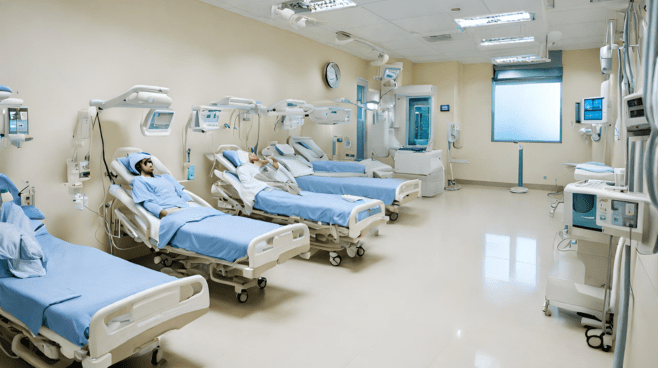The Best Hospital in Dubai-Healthcare System with our comprehensive guide. Navigate confidently as we walk you through the process of selecting the Best Hospital for your needs. Make informed decisions about your healthcare journey in Dubai with expert advice and valuable insights. Your definitive guide to a seamless experience in the vibrant city’s healthcare landscape awaits.
Introduction
Dubai, with its world-class healthcare system, offers a plethora of options when it comes to Hospitals. However, choosing the best hospital for your healthcare needs can be a daunting task. This guide aims to help you navigate the Dubai healthcare system and make an informed decision. From accreditation and specialization to accessibility and financial considerations, we will cover all the factors you need to consider when choosing a hospital in Dubai.
Primary Considerations in Selecting a Best Hospital in Dubai

Accreditation and Quality Standards
Accreditation plays a crucial role in ensuring the quality and safety of healthcare services. When evaluating hospitals, it is important to look for both local and international accreditations. Examples of local accreditations in Dubai include the Dubai Health Authority (DHA) and the Dubai Healthcare City Authority (DHCA), while international accreditations can include certifications from bodies like the Joint Commission International (JCI) and the International Organization for Standardization (ISO). Such accreditations demonstrate that the hospital has met stringent quality standards.
Aside from accreditations, certifications ensuring quality care are also essential. Look for hospitals that have received certifications such as the Gold Seal of Approval from the JCI or the Health Authority – Abu Dhabi (HAAD) Certification. These certifications provide reassurance regarding the hospital’s commitment to delivering high-quality healthcare services.
Specialization and Expertise
- When choosing a hospital, it is important to consider the range of medical specialties offered. Look for hospitals that have a diverse set of specialties to cater to different healthcare needs. Whether you require specialized treatment in cardiology, oncology, orthopedics, or any other specialty, ensure that the hospital you choose has the necessary expertise.
- To evaluate doctors’ expertise and qualifications, consider factors such as their education, experience, and specialization. Look for hospitals that have a strong team of highly trained and experienced doctors, preferably with qualifications from reputable international medical institutions.
- Additionally, assessing the availability of advanced technologies and treatments is crucial. Look for hospitals that invest in cutting-edge medical equipment and offer innovative treatment options. Advanced technologies and treatments can significantly enhance the quality of care and improve patient outcomes.
Reputation and Patient Satisfaction
- The reputation of a hospital and patient satisfaction are important indicators of the quality of care provided. Researching a hospital’s reputation involves reading patient feedback and reviews. Look for online platforms or patient forums where individuals share their experiences and opinions. This will give you insights into the hospital’s strengths and weaknesses.
- Assessing success rates and patient outcomes is another key aspect when evaluating a hospital’s reputation. Look for hospitals have high success rates in treating specific conditions or performing complex procedures. Patient outcome and statistics can provide valuable information regarding the hospital’s track record.
- Finally, trust and comfort play a significant role in decision-making. A hospital should not only provide superior medical care but also prioritize patient comfort and emotional well-being. Feeling safe and comfortable during your healthcare journey is essential for a positive experience.
Accessibility, Convenience, and Facilities

Location and Proximity
- When selecting a hospital, evaluate its distance from your place of residence or work. Consider the accessibility and convenience of reaching the hospital, especially during emergencies. Opting for a hospital that is closer to your location can save crucial time in emergency situations.
- Additionally, assess the availability of public transportation near the hospital. Easy access to public transportation can be beneficial, particularly for individuals who rely on it for their commutes.
Appointment Availability and Wait Times
- Timely access to healthcare is crucial for effective treatment. When choosing a hospital, check their appointment processes and availability. Look for hospitals that offer convenient appointment scheduling options, such as online booking systems.
- Understanding average waiting times is also important. Long waiting times can be stressful and may delay necessary treatments. Look for hospitals that prioritize efficient patient flow and strive to minimize waiting times.
Hospital Facilities and Amenities
- Hospitals with modern technology and equipment can provide better diagnostic and treatment capabilities. Assess the availability of state-of-the-art medical equipment, advanced imaging technologies, and cutting-edge surgical tools.
- Comfortable patient rooms and amenities should also be considered. Hospitals that prioritize patient comfort create a welcoming environment that promotes healing and recovery. Look for hospitals with cozy patient rooms, comfortable waiting areas, and facilities that cater to the needs of patients and their families.
Financial Considerations and Insurance Coverage

Understanding Healthcare Costs in Dubai
- Before choosing a hospital, it is important to review the pricing structures of different hospitals. The cost of healthcare services can vary significantly. Consider the affordability of treatments and procedures offered by different hospitals.
- Additionally, explore insurance coverage options. Review your insurance policy to understand the extent of coverage provided for different hospitals. It is essential to ensure that the hospital you choose is covered by your insurance plan.
Insurance Affiliation and Network Coverage
- Evaluate the insurance plans accepted by the hospital you are considering. Some hospitals have affiliations with specific insurance providers, while others may accept a wider range of insurance plans. In-network coverage ensures that more of your medical expenses are covered by insurance, reducing your out-of-pocket costs.
- Understanding in-network and out-of-network coverage is crucial. In-network hospitals have direct agreements with your insurance provider, resulting in lower co-pays and deductible costs. Out-of-network hospitals may require you to pay a higher portion of the medical expenses.
Payment Flexibility and Assistance Programs
- Assess the payment options and installment plans provided by hospitals. Flexible payment options can alleviate financial burdens and make healthcare more affordable. Look for hospitals that offer installment plans or discounts for upfront payments.
- Additionally, explore financial assistance programs that hospitals may offer. These programs can provide financial support to individuals who are facing financial constraints, ensuring that they can still receive necessary medical care.
Additional Factors to Consider

Emergency Services and Trauma Facilities
The availability of emergency departments within a hospital is crucial, as emergencies can happen unexpectedly. Assess the hospital’s emergency services, including critical care support and response times. Look for hospitals equipped with trauma facilities to handle unforeseen events effectively.
Multilingual and Cultural Competence
- Effective communication with healthcare providers is essential for optimal care. When language barriers exist, it can hinder communication and understanding. Evaluate the language skills of the medical staff, ensuring they can effectively communicate with you.
- Cultural sensitivity and understanding should also be considered. Hospitals that demonstrate cultural competence can provide care that respects your values and beliefs. Feeling understood and respected by the healthcare team is vital for a positive healthcare experience.
Aftercare and Long-Term Treatment Plans
- Assess the availability of rehabilitation and follow-up services after treatment. Aftercare is crucial for a successful recovery. Look for hospitals that provide comprehensive aftercare plans or have affiliations with rehabilitation centers or specialists who can support your long-term treatment needs.
- Continuity of care is important. Ensure that the hospital you choose has a system in place for sharing medical information and collaborating with other healthcare providers involved in your treatment.
Summary and FAQs
Recap of Key Considerations in Choosing the Best Hospital in Dubai
Choosing the best hospital in Dubai involves considering multiple factors. Accreditation, specialization, reputation, accessibility, financial considerations, and additional factors such as emergency services, cultural competence, and aftercare all play a crucial role in making an informed decision.
Frequently Asked Questions
1. What criteria should I use to evaluate a hospital’s reputation?
To evaluate a hospital’s reputation, you can consider factors such as patient feedback and reviews, success rates, and patient outcomes. Online platforms and patient forums can provide insights into the hospital’s strengths and weaknesses.
2. How can I check the accreditation of a hospital in Dubai?
You can check the accreditation of a hospital in Dubai by looking for local and international accreditations. Examples include the Dubai Health Authority (DHA), Dubai Healthcare City Authority (DHCA), Joint Commission International (JCI), and International Organization for Standardization (ISO). These accreditations ensure quality and safety standards.
3. What should I do if I have a medical emergency but I’m unsure which hospital to choose?
In a medical emergency, it is crucial to seek immediate medical attention. Call emergency services or head to the nearest hospital with emergency departments. Focus on receiving the necessary medical care first, and revisit the selection process when you are in a stable condition.
4. Does my insurance cover all hospitals in Dubai?
Insurance coverage varies depending on your insurance plan. Some insurance plans have affiliations with specific hospitals, while others offer wider coverage. It is important to review your insurance policy and verify the hospitals covered by your plan.
5. How can I ensure effective communication with healthcare providers if I don’t speak Arabic?
When language barriers exist, it is important to seek hospitals that have medical staff with multilingual capabilities. Look for hospitals that can provide language interpretation services or have personnel who can communicate fluently in languages you are comfortable with.
In conclusion, navigating the Dubai healthcare system and choosing the Best Hospital requires careful consideration of various factors. By evaluating accreditation, specialization, reputation, accessibility, financial aspects, and additional factors, you can make an informed decision that meets your healthcare needs. Remember to prioritize quality care, patient comfort, and effective communication for a holistic healthcare experience in Dubai.



